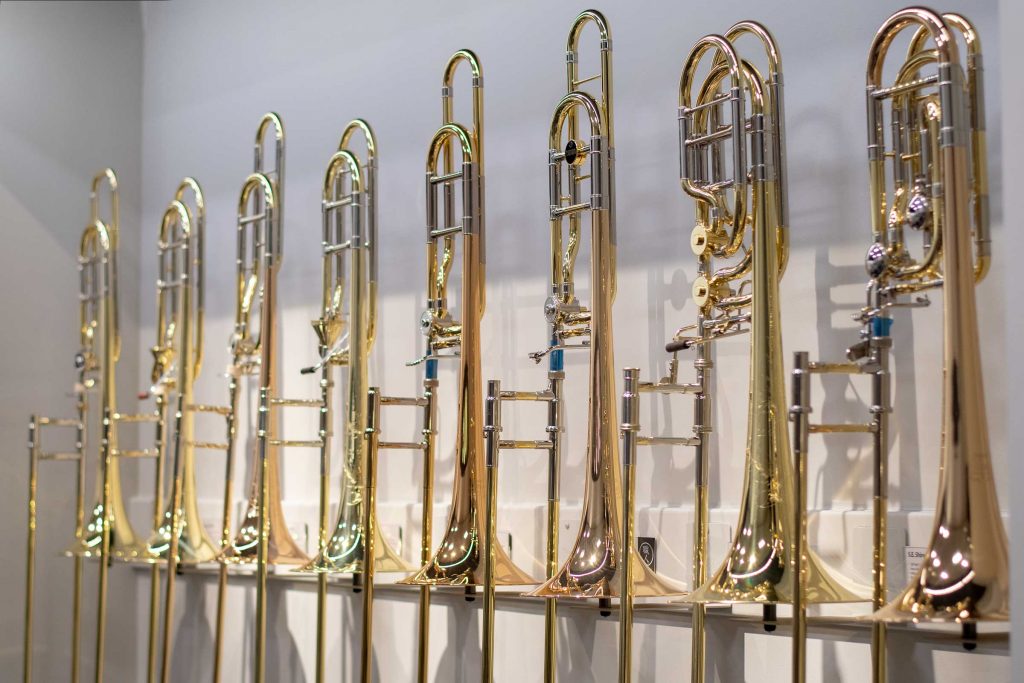Tips On Buying A New Trombone
Finding your next instrument can be a daunting task if you don’t have a game plan. The market is filled with a plethora of options, and sometimes it can be difficult to see the forest through the trees.From my time at Paige’s Music and my experience as a player, I can provide my thought process, and hopefully it will help with your future instrument selection.
Start by playing on your instrument.
Always, always, always limit the variables. Bring your current instrument and mouthpiece as well as familiar music. Warm up on your instrument and take note of how it sounds in the space around you. You need to have a control for the experiment, and your current instrument will provide that. Take out uncertainties like unfamiliar music, unfamiliar mouthpieces, and etc.
Bring a musician whose input you value.
While you are playing an instrument, you can only be so aware of how it sounds. The feedback a player gets is often different from what the audience hears, so it is crucial that you have someone else to let you know what they are hearing. Have your trusted advisor listen and write down his/her thoughts. I highly recommend bringing in your private lessons instructor if possible—they know how you play better than anyone else and are an excellent impartial adjudicator.
Sound
One of the most difficult things to change about an instrument is its natural tone characteristics. Start by playing long tones on the instrument you are testing to understand the instrument’s sound. Relax and send air through the instrument, and take time to listen.
Feel
The ergonomics of an instrument can take some time to get used to. Any new instrument will feel slightly different, and some may perceive this unfamiliarity as awkwardness. Unless an instrument is physically uncomfortable to hold it may just take some time to adjust. Take note of the width of the handslide. Some brands make narrower end crooks, which makes the handslide tubes closer together. This is a negligible difference in feel to most, but it may put the F-attachment valve too close for comfort to the jaw of some players. Keep in mind that the balance of an instrument can impact comfort as much or more than the overall weight. My general feeling is if you don’t notice the horn being uncomfortable, then it’s comfortable.
Resistance
Many customers tell me that they want something that is “free-blowing.” It seems that the word “resistance” is perceived as negative by many players, and that couldn’t be farther from the truth. Too much resistance is a bad thing. Too little resistance is also a bad thing. Instruments must be balanced, and without the appropriate amount of resistance in the right places an instrument might not work for you. If the horn allows it, you should also experiment with different leadpipe options.
Response and Projection
Put simply, “response” refers to how reactive a horn is to the player’s articulation and input of air. Lighter weight horns are often more responsive than heavier options. Heavier instruments often hold together better at louder dynamics. Consider the ensembles in which you play, and weigh the importance of the response and projection. If you play on a microphone most of the time you may be able to sacrifice some projection in order to gain more flexibility and quicker response. If you play in a symphony orchestra you may value stability and projection over flexibility and response. At the end of the day all of these factors are important, and you need to find an instrument with the right balance of everything.
Play everything.
Don’t enter the situation with a closed mind. You might have certain brands, models, or materials in mind, and that can often be a helpful starting point. Don’t allow preconceived notions to dictate what you’re willing to try. Some of the most prolific trombone sections have played on mixed equipment across the section, and the most important thing is finding the way to make your musical voice heard.


No Comments